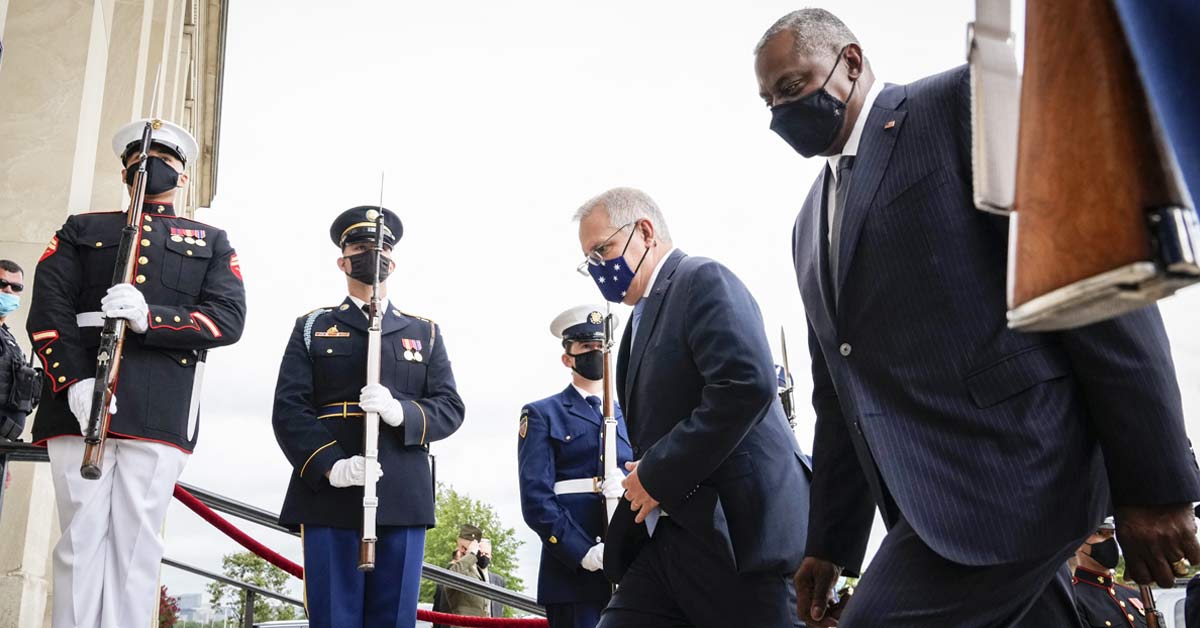The top diplomat of the Philippines issued a statement published on the Department of Foreign Affairs’ website on 19 September, 2021 saying that “The Philippines welcomes Australia’s decision to establish an enhanced trilateral security partnership with the US primarily and the UK. ASEAN member states, singly and collectively, do not possess the military wherewithal to maintain peace and security in Southeast Asia.”
According to Locsin, preventive diplomacy and the rule of law do not stand alone in the maintenance of peace and security.” Locsin further stated that, "The enhancement of a near-abroad ally's ability to project power should restore and keep the balance rather than destabilise it."
On the contrary, President Duterte expressed concern over the enhanced trilateral security pact (AUKUS) via Presidential Spokesperson Secretary Harry Roque during a virtual press briefing last week saying that it could trigger a "nuclear arms race". Roque said that Duterte will discuss further the country’s clear position on AUKUS in a cabinet meeting.
"Preliminarily, I can say that the President is the chief executor of our laws and the Constitution of the Philippines provides for the nuclear-free Philippines. And we are also a party to the ASEAN-Bangkok Accord providing for a nuclear-free Southeast Asia. So, I would say that the immediate concern of the Philippines is to ensure that its (Constitution) and its treaty providing for nuclear-free Southeast Asia will not be violated because of this accord”, Roque further said.
Sentiments
In essence, Duterte’s statement is consistent with the expressed concerns and uneasiness of some ASEAN member states like Malaysia, Indonesia, and even Vietnam that AUKUS may lead to a nuclear arms race in the region.
For instance, the Indonesian Foreign Ministry said, it is watching with caution the Australian government's decision to acquire nuclear-powered submarines. Indonesia is “very concerned about the continued arms race and projection of military power in the region”, a ministry statement said.
Whereas Malaysia’s Prime Minister Ismail Sabri Yaakob expressed similar fears and reservations that the trilateral pact between the three eyes will trigger a nuclear arms race in the contested Indo-Pacific region and at the same time, it will provoke other powers to act more aggressively in the region, especially in the South China Sea.”
“As a country within ASEAN, Malaysia holds the principle of maintaining ASEAN as a Zone of Peace, Freedom, and Neutrality”, he further said.
Likewise, the Hanoi Times reported that the spokesperson of the Vietnamese Ministry of Foreign Affairs, Le Thi Thu Hang said, “The nuclear energy must be developed and used for peaceful purposes and serve socio-economic development, ensuring safety for humans and the environment.”
Certain personalities in the Philippines also expressed some concerns and fears on the implications and possible impact of AUKUS on the country’s strategic and national interests.
Herman Laurel, founder of Philippine-BRICS Strategic Studies, a Philippine think tank and a respected opinion-maker in the country expressed his frustration over the new trilateral defense pact between the three countries.
He said, “As a Filipino, I am very sad to say that the Philippines' Foreign Secretary Teodoro Locsin created a very bad impression on its ASEAN partners and in the world by his seriously misaligned and misguided position on the AUKUS with mumbo-jumbo about antiquated "Cold War" "balance-of-power" rationalisation of a fawning tribute to the AUKUS saying it "would be beneficial in the long term.”
Laurel further said that, “In the short term, Locsin's endorsement of AUKUS has already undermined ASEAN centrality in the affairs of the region. It has already damaged the Philippines' standing in ASEAN and disrupted ASEAN solidarity, sentiment, and consensus which is overwhelmingly against the AUKUS alliance and nuclear sub deal. Neither is Locsin's fawning appreciated in the West, notably in the EU.”
Hindsight And Perspective
The newly formed trilateral security alliance between Australia, the US, and the UK is making the already difficult balancing act and strategy of ASEAN in maintaining equidistance between China and the US harder.
Locsin’s recent statement makes the Philippines appear more like the mouthpiece of the US and Australia rather than that of the Philippines, without an in-depth reflection as to how it will impact the country’s geopolitical positioning now and in the future.
It is also not helping President Duterte’s balancing act of maintaining cordial and fruitful relations with China and the US while pursuing an independent foreign policy of being friends to all but enemies to none.
In February, speaking during the inspection of newly delivered air assets to the Philippine Air Force (PAF) in Clark Air Base in Pampanga, President Duterte said the country cannot afford to get involved in a conflict and must opt not to take sides in the US-China rivalry. Duterte also said on that occasion that “he is in a tight balancing act insisting, however, that his government will remain neutral and his allegiance will be for the Filipino people in the midst of the tense geopolitical environment in the Asia-Pacific region”.
This balancing act will only get tougher if the country heeds the avowals of Locsin, which is akin to following the US blindly. It could have negative repercussions to the blossoming economic cooperation between the Philippines and China and the two countries’ flourishing friendship and mutual understanding.
China is now the Philippines’ number one trading partner, number one import source, and number two export market, and a major foreign investor. The ongoing vibrant economic ties between the two countries is a huge boost to the country’s quest for a quick bounce back economically from the economic devastation caused by the COVID-19 pandemic. Putting a strain on the economic cooperation between the Philippines and China is not to the advantage of the Philippines.
Likewise, if the Philippines backs AUKUS the way Locsin has professed, such a move may not only complicate and create uncertainties over the future of Philippine-China bilateral relations but may also undermine the ASEAN consensus and ASEAN centrality which has been defined as ASEAN's central role in the regional security architecture.
The Philippines which is in a very strategic position, geopolitically speaking in the Asia Pacific region, may end up as cannon fodder if a military confrontation breaks out between China and the US with its allies over Taiwan or the South China Sea (SCS).
If this happens, the national survival and security of the country will be undermined and compromised. There’s also the presence of American boots on Philippine soil because of the Visiting Forces Agreement (VFA) between the Philippines and the US to consider.
The VFA is not only the operational framework of the Philippines-US security alliance but also is part of the wide-ranging and extensive network of US-led systems of security alliances and partnerships in the Asia-Pacific region. The US military operates around the world because of the Status of Forces Agreements (SOFA) in 100 or so countries. SOFA is an agreement between a host country and a foreign nation stationing its military forces in that country.
This US-led system of security alliances and partnerships is part of the US-dominated regional security architecture of which the VFA is a component that operationalises the Philippines-US alliance embodied by the Mutual Defense Treaty.
Likewise, there’s also the presence of EDCA (Enhanced Defense Cooperation Agreement) bases in the country, which could be targeted if military confrontation breaks out in the Asia Pacific region between the two superpowers.
These EDCA or US bases across the Philippines, namely Subic Bay Naval Base, Basa Air Base, Fort Magsaysay, Antonio Bautista Air Base, Mactan-Benito Ebuen Air Base, and Lumbia Air Base, are ideally located for US purposes. They're near or on the South China Sea, significantly enhancing the US military’s ability to challenge Beijing. Without them, Washington would have to rely more heavily on more distant bases in Guam; Okinawa; mainland Japan; Darwin, Australia; Hawaii; and elsewhere.
Hence, amidst the challenging and growing power rivalry in the Asia Pacific region among the superpowers and AUKUS, ASEAN countries like the Philippines have to figure out a way forward without sacrificing peace and stability in the region.
According to Brigadier General Victor Navarro Corpus, a retired Filipino military officer and the former chief of the Intelligence Service of the Armed Forces of the Philippines (ISAFP), the best option for the Philippines amid the heightening power projections and rivalry between powerful countries like China and US is strict neutrality.
This means that the outgoing Duterte administration and the next administration after the 2022 national elections should seriously ponder if siding with one power is to the advantage of the country’s core national interests, or if the adaption of strict neutrality is the best choice to protect Philippine national and security interests.
Conclusion
In light of these regional geopolitical realities and developments, the Philippines should try to insulate itself from the strategic rivalry of China and the US. Neutrality by rejecting outright alignment with the US is the way forward for the Philippines. The country will be better off if it maintains equidistance between China and the US while pursuing and preserving its national core strategic interests.
The ASEAN bloc can do without this balance of power paradigm. Instead, it needs not so much a balance of power but collective security through a combination of multilateralism and bilateralism, by championing ASEAN Centrality while pursuing win-win solutions to regional problems and challenges in pursuance of peace, stability, and prosperity in the region.
The views expressed in this article are the author’s own and do not necessarily reflect those of The ASEAN Post.

